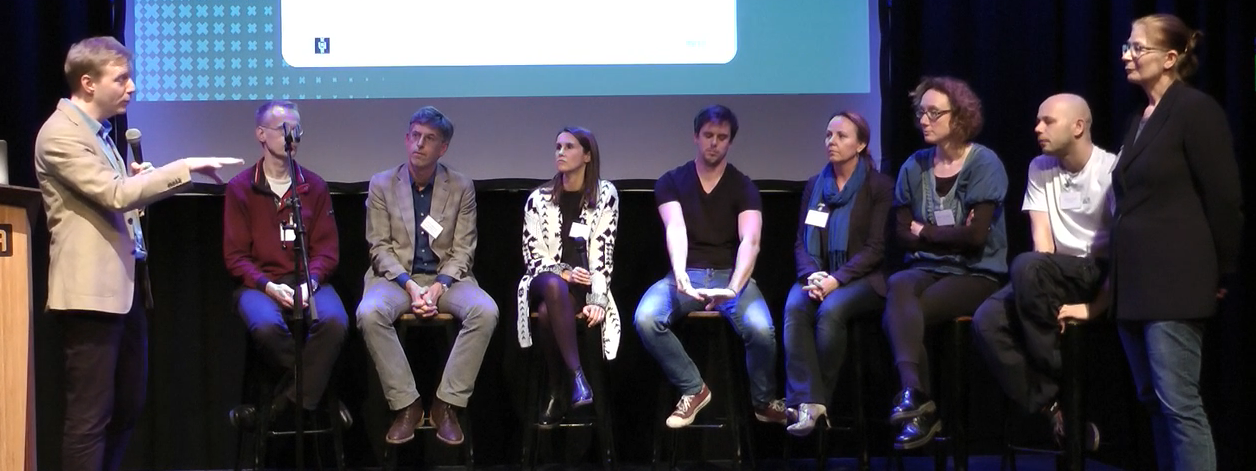
Teaching Timesavers
The FMG Knowledge Sharing Matchmakers, on behalf of the newly formed FMG Educators Community, held their first event on Tuesday, 20 February at CREA. With more than 50 members of the FMG educators community in attendance, the goal was to highlight tips on how to save time when teaching.
You can find the event slides here download (use keyboard arrows to navigate) and Antoinette Muntjewerff’s slides download here.
Did we save you time?
Yes. And No. Well… maybe. Oh and you can see for your self on our YouTube channel .
At the end of the event, one of the attendees said it best: “it’ll probably take me a few months to reach a zero-sum game … I spent 90 minutes here, and hopefully some of these tips can earn that time back quickly … other tips will take a long time for me to implement … so they’ll eventually save me time … and others, well, some tips are never going to work in my department…”.
We agree.
Some of the tips were short and sweet and easy to reproduce, and perhaps might shave a few minutes off your daily schedule. We love those kinds of tips! Here we say “YES! We saved you some time!”
Some of the tips, however, require a greater structural change than might be possible in your department. So, in the long haul they might work, but implementation will take time. Here we say “Maybe we saved you time!”
And some of the tips are just not simply feasible for some departments, some forms of teaching, or some learning environments. And here we say “Nope … no time-saving here.”
The Big Messages from the event
- Don’t Compromise on the “Big” Stuff. Your connection with your students matters. Efforts to support this connection are worthwhile. Can you be in the classroom when they enter? Even in large rooms, a nod of recognition can build those bonds. Can you talk with students during the break? Is it possible to be available for 5-minutes after class for questions? In small groups, can you make an effort to learn student names? Or even use nametags so that your reactions to them are more personal? Can you find ways to encourage student engagement in your lecture? Small moments can lead to important connections.
- Delegate, When Possible. It’s not always possible to delegate teaching activities, but if you can delegate, take advantage of this opportunity. Are there junior scholars (e.g. PhD Candidates) that might want to deliver a lecture in your classroom? In team-based teaching, rather than assuming “equal division”, focus on division of tasks based on skills and preference. Some individuals prefer to cozy-up with student papers at a local café while others feel best in front of the room. It won’t always happen, but if it can happen, consider it!
- Communicate, Clearly and Directly. We all have different ways to communicate with our students. From a “no email ever” policy to “all email all the time”, the range is vast and – as we saw – there is no right answer. But, we also heard that communication is something so many of us struggle to balance. It seems that the key time-saving route here is setting up policies and communicating them clearly and directly. If you opt for no email and instead prefer weekly office hours or meetings by appointment on set days, state that in your handbook and on day 1. If you opt for a separate email address to keep course matters separate, state that and stick with it. If you have policies on when and how you respond, state that – and again, stick with it! Identify the time-saving approach that works for you, and go with it. Just remember – being accessible to students does not mean 24/7 accessibility. Clearly and directly define your accessibility, and stick with it!
- Peer Power. Look at your teaching – are there ways to capitalize on peer power? Peers can comment actively on a discussion board to answer common course questions, and you can check-in on the responses at a schedule YOU determine. Peers can (with the help of a writing rubric) review early writing drafts and, hopefully, make the final work that you are grading of higher quality (better papers tends to require less grading time). Peers can also provide information about missed lectures to students – the “find a buddy” system works well here! Consider asking your colleagues how they think peer power can be used as well. You never know what timesavers you might learn!
- New Tech, Old Tech, No Tech. Decide whether technology is helping or hurting your time spent teaching. Juypter Notebook might be a great option for some people in methodological / technical courses, but for others, it might be an added headache. CANVAS pages might be the exact inroad you need to achieve blended learning and increase efficiency in your lecture, but for other classes, it simply might be a solid home for course slides. And speaking of course slides, how much time are you spending “prettying” your slides? If technology can make your teaching more efficient and save you time, then by all means – embrace it. Take the CANVAS course so that in 1-hour you learn all the things you need to know to leverage its power, ask a colleague for a Juypter introduction, or learn how digital discussion boards can put peer power into action. But if it won’t save you time, just skip it. Flashy isn’t always best. As we saw in our event, sometimes simple is all you need.
- Feedback in a Flash. In a flash, we wish! Feedback is often a key challenge for us all. Students say they want it, we believe in it, but it takes a long time. Sure, years of experience helps cut this down, but still – feedback is a time SUCK. We heard some great tips to help with this. Give detailed feedback on one paragraph and then inform students to apply this logic to the rest of the paper. Spend the time to make a detailed rubric, score based on that with no in-text written feedback, and offer office hours (10 minute sessions!) for those who wish to get more 1-to-1 feedback during a pre-determined timeslot (8am on Friday, anyone?! J). Or consider making a FAQ that goes with the paper feedback to explain your short-hand (i.e., “when you see “AWK” – indicates awkward sentence formation”) …stick with your short-hand notes across classes and you can then rely on this one sheet for all of your teaching feedback. Don’t be afraid to streamline your steps.
- Assess your Assessments. Papers and testing are the most common ways of assessing knowledge, sure. But, can you find other ways to assess knowledge gains? As we heard, in a small course, in-person “exams” could potentially work. Or perhaps you can reduce the number of open-ended questions and move towards more robust multiple choice questions (aka quick grading)? Does a paper need to be 10 pages where, really, you can assess knowledge gains in 3 or 4? Can you find a way to leverage the power of group assignments and presentations (group scoring = less grading than individual assignments)? The mantra “if it’s not broke, don’t fix it!” stands here – if all is well, let it be – but, if there are ways to improve and streamline, consider taking the leap. Digital testing – we are looking at you!
- Be Happy. Find Support. Practice Self-Care. We didn’t get into this last night, but maybe we should have. Research has shown that even the greatest workaholics fare better when they find support and practice self-care. Now, we aren’t saying “Go Be Workaholics!” but instead, we are saying “Take Care of You”. Teaching is an awesome opportunity and, hopefully, you find joy in what you do (most of the time, at least!). It’s not an easy job. We are making a difference in students’ lives and that requires time, commitment, and energy. But it is an important job. Try to always see the happy in it. Rely on support from others on the tough days – here enters the awesome #fmgEduCom which we hope you will use. And don’t forget self-care. Whether it’s a long run, a yoga session, a good book, a hot cup of tea, an outing with your children, or a perfectly chilled beer – don’t forget to keep you on the to-do list. Time is short, we know, but always leave time for you.
So, was it a success?
We think so. We were happy to see so many people attending this event – it is confirmation (for us) that events like this are welcomed by the FMG teaching community. It is also confirmation that, although we might teach in different spaces and in different manners, we also share the struggles that go into creating an effective pedagogical experience.
But we have work to do. We noticed that sometimes it wasn’t clear that the tips that might work in one department or classroom won’t work in another. The challenges we are facing – yes, that’s more common across – but not all tips work for all people. In a way, although we all speak “teacher” at the FMG, we have different dialects – and sometimes we need a translator to make sure the meaning gets across. We can do this better. That’s our role – to facilitate knowledge sharing – and that means doing the translation too – identifying how initiatives in one department could be re-envisioned in another. We are already brainstorming ways to work on this for our next event, and welcome your thoughts as well. There is much to be learned from each other. As Antoinette mentioned last night, experience is powerful – and together, we have a LOT of experience.
What Happens Next?
This first event was a learning experience for all of us. Some things we absolutely got right (yay bitterballen!) and some things need some work. We are committed to becoming an important resource for our FMG teachers. Our next event – Mastering Discussion on April 9th – will feature the renowned Mariska Knoll as she helps us all think about ways to leverage the mighty discussion in our own classrooms. Bitterballen will still be on hand (#winning) but we are also going to work harder to find a common language across our disciplines (#improvement) so that when you leave – the translation work has already been done (or at least started) for you.
We are also going to work to leverage the power of our CANVAS community – please join and contribute. And we will begin sharing relevant information on Twitter using the hashtag #fmgEduCom …. Not just UvA specific, but anything we think might support you in your daily life. Follow along the hashtag road, and of course, join us in the conversation!
Thanks for helping us kick-off #fmgEduCom – here’s to more events, more inspiration, more support, and of course, more bitterballen!
Best wishes,
Your FMG Knowledge Matchmakers





